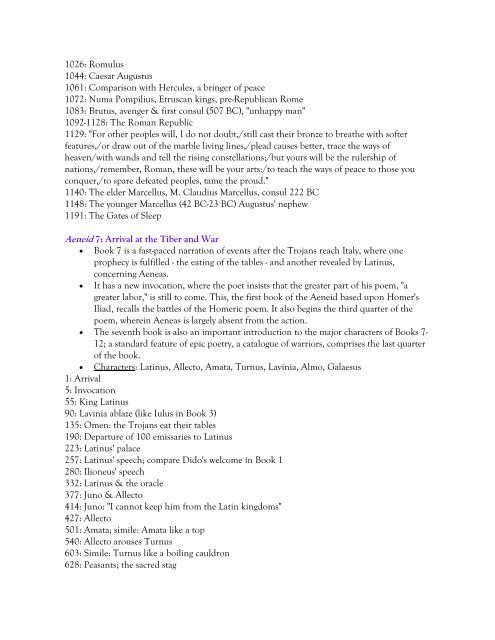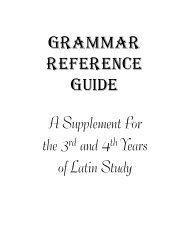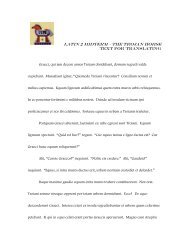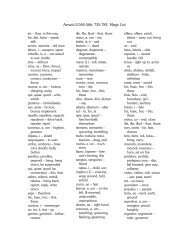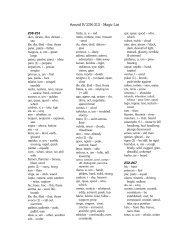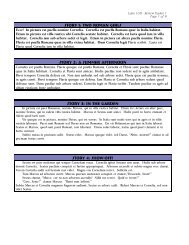Create successful ePaper yourself
Turn your PDF publications into a flip-book with our unique Google optimized e-Paper software.
1026: Romulus1044: Caesar Augustus1061: Comparison with Hercules, a bringer <strong>of</strong> peace1072: Numa Pompilius, Etruscan kings, pre-Republican Rome1083: Brutus, avenger & first consul (507 BC), "unhappy man"1092-1128: The Roman Republic1129: "For o<strong>the</strong>r peoples will, I do not doubt,/still cast <strong>the</strong>ir bronze to brea<strong>the</strong> with s<strong>of</strong>terfeatures,/or draw out <strong>of</strong> <strong>the</strong> marble living lines,/plead causes better, trace <strong>the</strong> ways <strong>of</strong>heaven/with wands and tell <strong>the</strong> rising constellations;/but yours will be <strong>the</strong> rulership <strong>of</strong>nations,/remember, Roman, <strong>the</strong>se will be your arts:/to teach <strong>the</strong> ways <strong>of</strong> peace to those youconquer,/to spare defeated peoples, tame <strong>the</strong> proud."1140: The elder Marcellus, M. Claudius Marcellus, consul 222 BC1148: The younger Marcellus (42 BC-23 BC) Augustus' nephew1191: The Gates <strong>of</strong> Sleep<strong>Aeneid</strong> 7: Arrival at <strong>the</strong> Tiber and War• Book 7 is a fast-paced narration <strong>of</strong> events after <strong>the</strong> Trojans reach Italy, where oneprophecy is fulfilled - <strong>the</strong> eating <strong>of</strong> <strong>the</strong> tables - and ano<strong>the</strong>r revealed by Latinus,concerning Aeneas.• It has a new invocation, where <strong>the</strong> poet insists that <strong>the</strong> greater part <strong>of</strong> his poem, "agreater labor," is still to come. This, <strong>the</strong> first book <strong>of</strong> <strong>the</strong> <strong>Aeneid</strong> based upon Homer'sIliad, recalls <strong>the</strong> battles <strong>of</strong> <strong>the</strong> Homeric poem. It also begins <strong>the</strong> third quarter <strong>of</strong> <strong>the</strong>poem, wherein Aeneas is largely absent from <strong>the</strong> action.• The seventh book is also an important introduction to <strong>the</strong> major characters <strong>of</strong> Books 7-12; a standard feature <strong>of</strong> epic poetry, a catalogue <strong>of</strong> warriors, comprises <strong>the</strong> last quarter<strong>of</strong> <strong>the</strong> book.• Characters: Latinus, Allecto, Amata, Turnus, Lavinia, Almo, Galaesus1: Arrival5: Invocation55: King Latinus90: Lavinia ablaze (like Iulus in Book 3)135: Omen: <strong>the</strong> Trojans eat <strong>the</strong>ir tables190: Departure <strong>of</strong> 100 emissaries to Latinus223: Latinus' palace257: Latinus' speech; compare Dido's welcome in Book 1280: Ilioneus' speech332: Latinus & <strong>the</strong> oracle377: Juno & Allecto414: Juno: "I cannot keep him from <strong>the</strong> Latin kingdoms"427: Allecto501: Amata; simile: Amata like a top540: Allecto arouses Turnus603: Simile: Turnus like a boiling cauldron628: Peasants; <strong>the</strong> sacred stag


